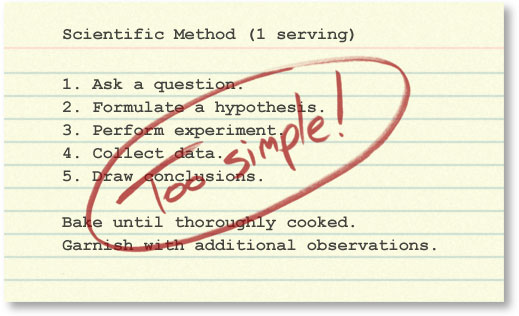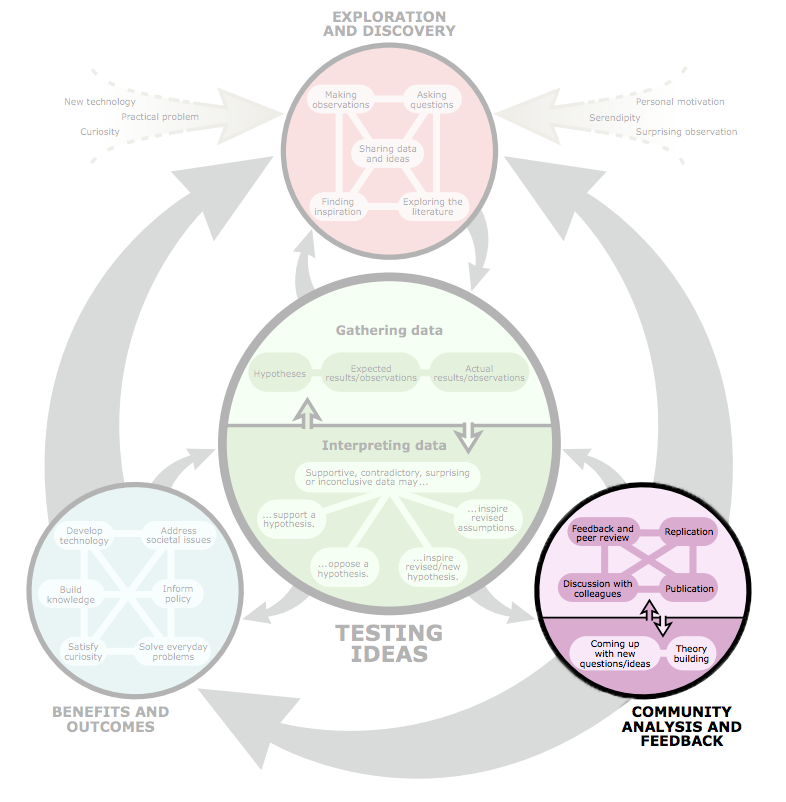PeerJ - the science journal we need and deserve
This post initially appeared on Science Blogs
I spend a lot of time thinking about the scientific method. I don't mean that thing you learned in high school, where you make an observation, form a hypothesis, design an experiment etc etc. That's certainly part of the scientific method, but the linear formula that freshmen are typically forced to memorize sucks the life and interest out of what it is that my colleagues and I do on a daily basis. Source: The fantastic "How Science Works" from UC Berkeley (click image)
The process of doing science is messy and complicated, and most of the time it doesn't work. There are false starts, bad experiments, bad interpretations, wrong or incomplete controls and sometimes you just forget to add salt to your buffer. But science is the only path to knowledge where all of these problems, the flaws of human planning, perception and cognition, are baked into the process and corrected for. One of the most important parts of that corrective influence, and what's missing from the scientific method as conceived in high school, is the discussion and debate that comes from sharing the results of our experiments with others. Modified from "Understanding Science" - click for source
For the last hundred years at least, this has largely meant publishing findings in a journal. At their inception, journals were just ways to aggregate and disseminate the letters that scientists already sent around to each other - in other words, journals increased science communication. Not anymore.
These days, most published science remains locked in silos controlled by publishers. Even wealthy institutions like Harvard are being crushed under the weight of subscription fees, and if you don't belong to an institution, you're likely to pay around $30 for a single article! Scientific journals are now impediments to the free flow of scientific information.
However, as with so many things in the internet era, the old model is breaking down and the entrenched interests are kicking and screaming to hold onto their supremacy. Unfortunately for all of us, these entrenched interests have an advantage that other disrupted industries do not.
Because the rise of journals occurred in tandem with the rise of professional, publicly funded science, the two are now inextricably linked, to the point where the publication of discoveries in journals is necessary to maintain a career in academic science. Job prospects, grants and promotions all depend on the quality and quantity of publications.
Institutional barriers prevent individual researchers from innovating with publishing strategy because doing anything outside the standard model would hurt their ability to be promoted and more importantly, to get the grants they need to do science. The good news is that some enterprising people are starting to build journals that work within the current model of science publishing, but aim to disrupt it from the inside. Enter PeerJ, a new online-only journal that published its first papers today.
The Open Access movement has made great strides, but there is still a long way to go before all academic content can be freely read, broadly distributed and openly re-used by anyone, regardless of geography, education or wealth. A long way, but it is a worthy trip to undertake.
And so this is why we believe so strongly in the mission of PeerJ. We want to be a catalyst for change within the system of academic communication. We want to publish science in an effective, efficient, rapid, innovative, respectful, professional and, above all ‘Open’ manner.
PeerJ has built a new open access journal, following the likes of the Public Library of Science (PLoS) and the much more recent journal eLife. However, where PLoS and eLife seem to be trying to build classic journals with an open access (OA) model, PeerJ seems to be trying to innovate on everything about the publishing process, from open peer review, to the integration of altmetrics, to the simple idea of publishing articles as they come in (like a blog) rather than in separate issues.
They're even planning to launch a pre-print server, which means that scientists will be able to upload their work to establish primacy (physicists have had something like this for a while), that can serve as an OA source, even for papers that eventually get published in a non-OA journal.
A little while ago, in response to a boycott of the publisher Elsevier, I wrote
We don’t need any academic journal’s services anymore. If you publish in any journal, you are making it easier for them to take action that harms academic institutions, so you shouldn’t[...]
[T]he truth is, journals add very little value to science, and impose huge monetary costs, as well as costs in terms of delayed publication and limited distribution[...]
In my idyllic world, every lab has their own blog, and publishes their results in real time, sharing them on a site like ResearchGate. Individual figures can be indexed on something like FigShare. Scientists can post their negative or confusing data and ask the entire world for help, or talk about their research plans and get critiqued. Meanwhile,altmetrics are being generated in real time to asses the validity of data, and scientists peer review on their own blogs or at some central location. The distribution of scientific knowledge returns to the model of the 19th century – free and openly distributed – but now also instantly and globally distributed at the same time.
My model of every scientist with their own blog may be too unwieldy, but PeerJ has built a journal that does almost everything I've been looking for, and are poised to show that this model can work and that it's better. I also wrote:
Science benefits when the flow of information is unrestricted and everyone benefits when scientific knowledge advances. Journals no longer assist in the distribution of knowledge, they only impede it, and no one benefits from this arrangement except the journals themselves. It’s time for something new.
PeerJ might be that something new. Here's hoping they prove me right.

